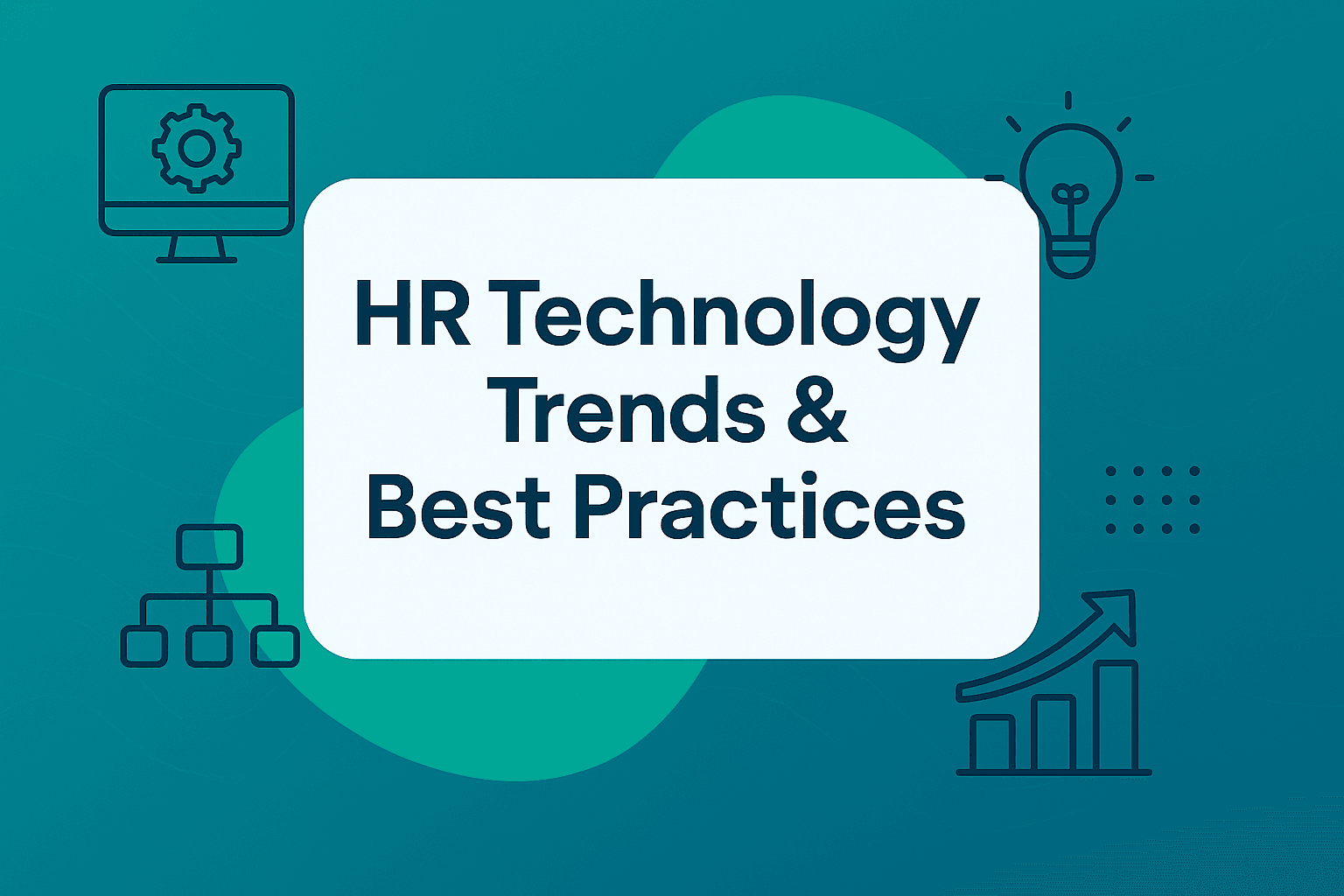Top HR Technology Trends & Best Practices for 2025
Updated : 4 months ago
 The HR technology landscape is changing at a faster pace. In fact, global HR tech spending is expected to grow from USD 36 billion in 2024 to roughly USD 70 billion by 2033.
The HR technology landscape is changing at a faster pace. In fact, global HR tech spending is expected to grow from USD 36 billion in 2024 to roughly USD 70 billion by 2033.
The growth is driven by post-pandemic digital adoption, remote, and hybrid work models. It even demands data-driven decision-making.
What are the top HR technology trends for 2025?
The following HR technology trends highlights where HR leaders need to invest to improve recruiting efficiency, employee engagement, and compliance.
1. Hyperautomation and Intelligent Screening
AI is becoming mature every day. More HR tasks are being automated. A study notes that “the tasks that can be automated, those should be.” It highlights hyperautomation as a key trend. AI chatbots improve employee experience by delivering information to the workers.
They also provide HR teams with relevant data. Intelligent resume-parsing tools can sift through CVs depending on the experience and education. Those prioritize qualified candidates.
With uRecruits, recruiters don't only use AI but Authentic AI. It actually thinks and acts on their behalf. It automates time-consuming tasks such as -
- Sourcing
- Screening
- Candidate communication
Instead of spending a lot of hours reviewing resumes or sending follow-up emails, recruiters can focus more on meaningful work.
They can look after interviews and relationship-building. The result? There is faster hiring, better candidate matching, and more time for what is really needed.
Best Practice
You need to adopt AI screening tools cautiously. Choose vendors with explainable algorithms and make rules. It keeps automated decisions fair and auditable. Human oversight should be the focus to prevent bias and ensure quality hires.
2. Data-Driven Decision Making
Advanced analytics and machine learning allow HR teams to analyze large data sets and generate insights. The machine-learning models can identify which initiatives are more effective. You can then optimize workforce utilization and predict employee turnover. Enterprise HRM vendors are “beefing up” AI features to provide better people analytics.
Best Practice
You can invest in dashboards that provide real-time data on -
- Hiring funnels
- Candidate quality
- Diversity metrics
- Cost-per-hire.
3. Skills-Based Talent Management
Skills validation and talent intelligence are rising priorities. Deloitte highlights that skill-based organizations drive positive workforce experiences. They focus on better outcomes when they centralize skills data and use objective measures to validate skills. HR leaders should inventory their current skills-validation approaches. They should also align on when and how to validate skills.
Best Practice
- Develop a single skill across the organization.
- Integrate data from assessments, performance reviews, & training.
- Use AI-based skills validation to match candidates with roles.
4. Hybrid & Remote Work Enablement
Hybrid work is the new norm. Research shows that 74% of the companies have adopted hybrid models or are moving toward one. Managing distributed teams across different locations and time zones requires scalable HR technology.
Cloud-based HR platforms, remote desk-booking tools, and integrated databases help HR teams support remote employees. You need to know that outsourcing certain HR functions can free internal teams to focus on strategic work.
Best practice
You can invest in cloud-native HR systems. These allow employees to update their own data. They then submit time off and access learning resources from anywhere.
It provides managers with tools to monitor remote productivity. Further, it balances monitoring with trust and respect for privacy.
5. Employee Well-Being & Mental Health
Remote work has heightened attention on mental health. A survey of large employers found that 88% plan to offer online mental health resources.
Many lower costs or provide manager training to support employee well-being. Telehealth and AI-based therapy platforms are gaining traction.
Best practice
It provides employees with access to mental-health resources. Along with counselling and wellness tools.
You can create safe channels for employees to share concerns and use sentiment-analysis tools. These detect engagement and burnout.
You can highlight these features in your marketing to showcase care for employees.
6. Compliance & Ethical AI
Compliance requirements are becoming stricter with increasing dependency on AI. HR technologies should adhere to the rules and regulations, such as -
- EEOC guidelines
- GDPR/CCPA data privacy rules
- New salary-transparency laws.
Bias audits and algorithmic fairness checks all the essentials.
Best Practice
Make sure that AI models are explainable and auditable. You can give candidates the authority to opt in to data processing and to request deletion. Conduct regular bias audits and work with some legal experts to stay compliant.
7. HR’s AI spending is growing fast
AI is quickly becoming the foundation of how HR teams work — helping them plan, make decisions, and deliver value.
More than half of all companies (about 55%) are now increasing their HR tech budgets. By 2030, the market for AI in HR is expected to triple in size.
Today, AI tools are being used for almost everything. It is from hiring and onboarding to tracking performance. Then, for training employees and planning the workforce.
But as spending grows, so does the pressure to prove that this technology really makes a difference.
Still, not every company is using AI the same way. Around 49% of HR teams use it for recruitment. However, fewer than 15% use it for things like performance reviews or employee development.
The results also vary -
- Top-performing companies see returns of 55% or more, while others get as little as 5%.
Simply spending money on technology doesn’t guarantee success. To truly benefit, HR teams need the right strategy and skills to use AI effectively.
That means choosing tools that solve real workforce problems. Then, training people to work with AI every day and build systems that support its use across the company.
The organizations that plan and prepare well will be the ones that see real, measurable impact from their AI investments.
8. Human strengths will define HR’s future impact
AI takes on more technical and transactional work. And, the distinct value HR brings is increasingly rooted in human capabilities.
Empathy, ethical judgment, communication, and culture-building are emerging as critical differentiators in workplaces. And the machines handle much of the routine. These human skills are not “nice to have” soft attributes, but are becoming essential. These guide organizations through change, maintaining trust, and sustaining culture in an era of rapid automation.
The shift is already visible in the broader talent market.
Nearly three in five employers say soft skills are more important today than they were five years ago. And, the demand for social and emotional skills is expected to grow by 26% by 2030.
Within HR, it means capabilities like coaching, influencing, and emotional intelligence are moving from the sidelines to the core of what the function must deliver.
These skills are especially important in moments of uncertainty, where HR is called on to guide leaders. They then support employees and hold space for complex conversations about change.
Digital and analytical skills are rising in demand. However, emotional intelligence, adaptability, and influence are now just as important for HR professionals who want to remain credible, trusted, and effective.
As businesses change, HR will increasingly be expected to put human skills into daily practices. They model them for the broader organization. HR professionals must invest in their own development, actively building skills like -
- Empathy
- Coaching
- Trust-building
- Ethical judgment.
These should be visible in everyday interactions with employees and leadership, not just outlined in strategy documents.
Finally…
HR leaders face unprecedented complexity. However, it comes with an amazing opportunity. When you use the above-discussed HR technology trends, the organizations can transform HR from an administrative function to a strategic powerhouse.
uRecruits’ agentic AI recruitment platform is built to support the transformation. It helps HR teams move faster, hire smart, and foster a culture of fairness and belonging.

